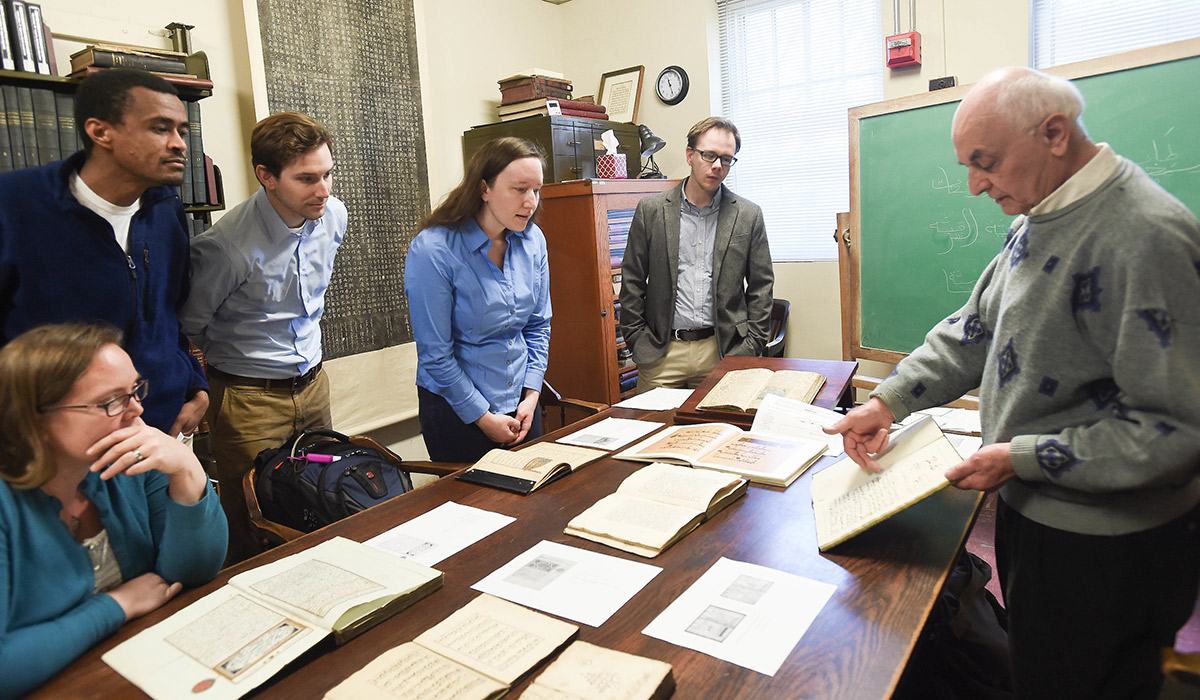M.A. in Semitic and Egyptian Languages and Literatures
Students on the master of arts level may specialize in Ancient Northwest Semitic languages (ANWSL) or Near Eastern Christian languages and literatures (NECLL). MA students choose two primary research languages and generally do course work in additional languages as well. ANWSL students usually specialize in Aramaic and Hebrew, while NECLL students specialize in Arabic, Coptic, or Syriac. The ANWSL program offers Akkadian, Ugaritic, as well as extensive coursework in Aramaic (Old, Official, Qumran, Targumic) and Hebrew (Epigraphic, Qumran, Mishnaic). In the NECLL program, students may also take Armenian, Georgian, and South Arabian.
Under ordinary circumstances the master's degree, including the requisite comprehensive examinations, can be completed in two years. Thirty semester credit hours are required for the M.A. The thirty credit hours must include nine in the student's major language beyond the introductory course or courses. The thirty credit hours must also include at least six credit hours, beyond the introductory course or courses, in a second Semitic language (or Coptic) judged by the faculty to be the most necessary for effective work in the student's major field. Up to six credit hours of Greek (beyond the elementary level) may be counted towards the M.A. requirements but not for major or minor language credit. ANWSL students may take history or language courses (including Syriac, Arabic, Ethiopic, and Coptic) from the NECLL program; NECLL students may take history and language courses (including Hebrew and Aramaic) from the ANWSL program. In addition to these thirty semester credit hours, the M.A. student must select (with the approval of the chair) two papers written for courses (completed with a grade of B or better) requiring a major research paper. After the courses are completed, the student must revise the papers if necessary and resubmit them to the major professor and to an additional reader for approval.
Students who wish to pursue a program combining aspects of both major programs are urged to consult in advance with all relevant faculty.
Transfer of relevant graduate credits earned at other accredited institutions is permitted in accordance with the university's regulations. Students entering at the M.A. level may transfer up to 6 credit hours.
Students are expected to maintain a good overall standing in the program; students who do not do so will be subject to faculty review and dismissal, if warranted. In particular, a student who receives one C may be subject to faculty review and may be placed on probationary standing in the program. A second C may lead to dismissal. A student may repeat a course in which the grade of C was earned, and the grade of the retake may replace the C; this can only be done once and must be done in consultation with the faculty.
Language Requirements
Students in the NECLL (Near Eastern Christian languages and literatures) program are required to take six credits of Greek or to have taken a year of coursework in Greek prior to entering the program. The Greek requirement must be completed prior to sitting for M.A. comprehensive exams. Students in the ANWSL (Ancient Northwest Semitic languages) program are also encouraged to meet this requirement.
A reading knowledge of French and German is strongly recommended from the beginning of graduate studies. Before sitting for M.A. comprehensive examinations, all candidates must fulfill the modern language requirement in one of the abovementioned languages by either successfully passing the qualification examination or by completing French 500 or German 500. Ph.D. candidates must fulfill the requirement in both French and German. With the consent of the chair, students have the option of substituting Modern Hebrew for French.
Comprehensive Examinations
M.A. degree candidates must, with the permission of the department chair, register for M.A. comprehensive examinations in their major and minor languages. They must register for the comprehensive examinations before the beginning of the semester in which they will take the examinations. For the grading rubric and FAQ on our M.A. comprehensive exams, click here.
Courses Offered
Consult Cardinal Station for additional information about courses and to determine course offerings by semester.

